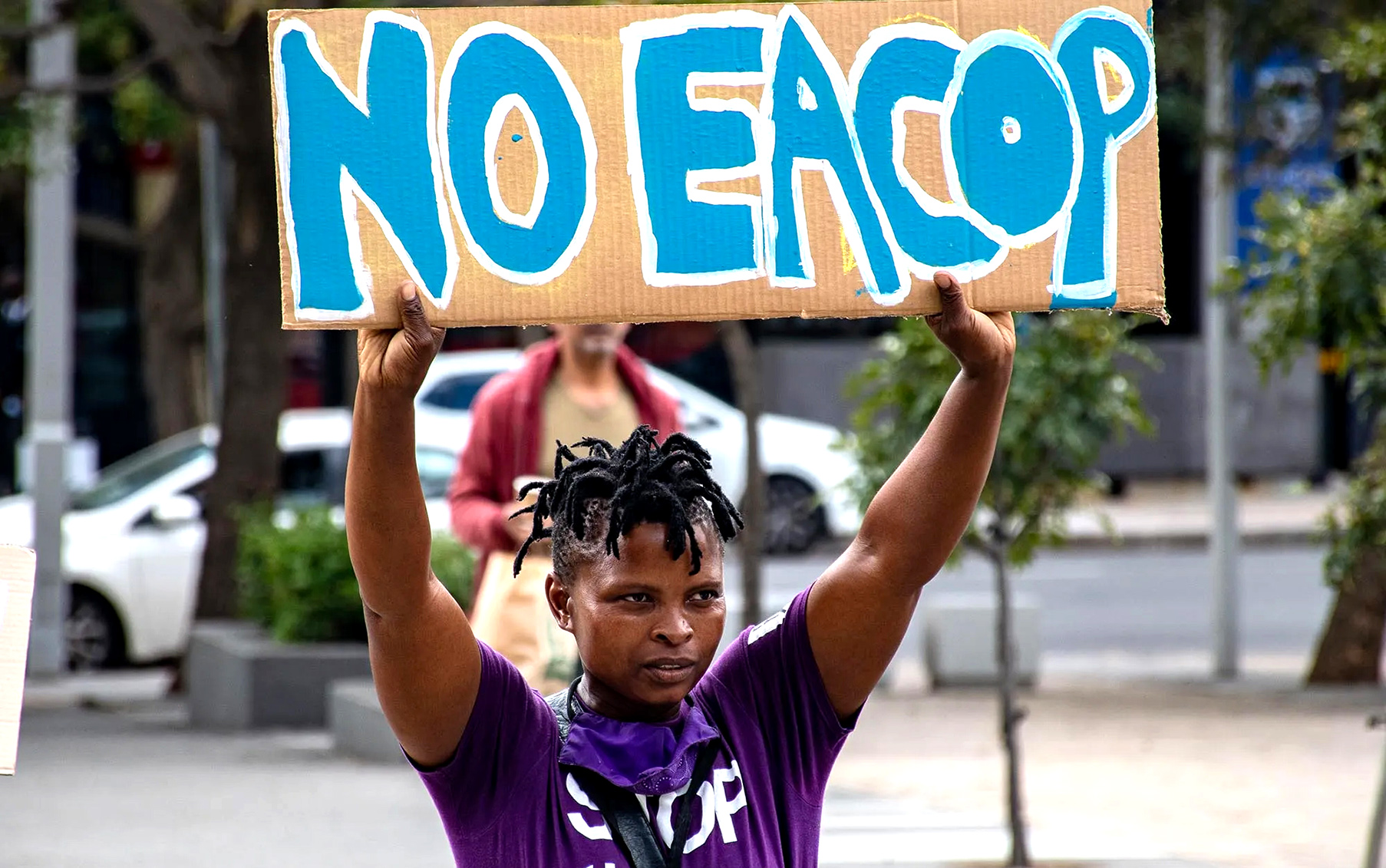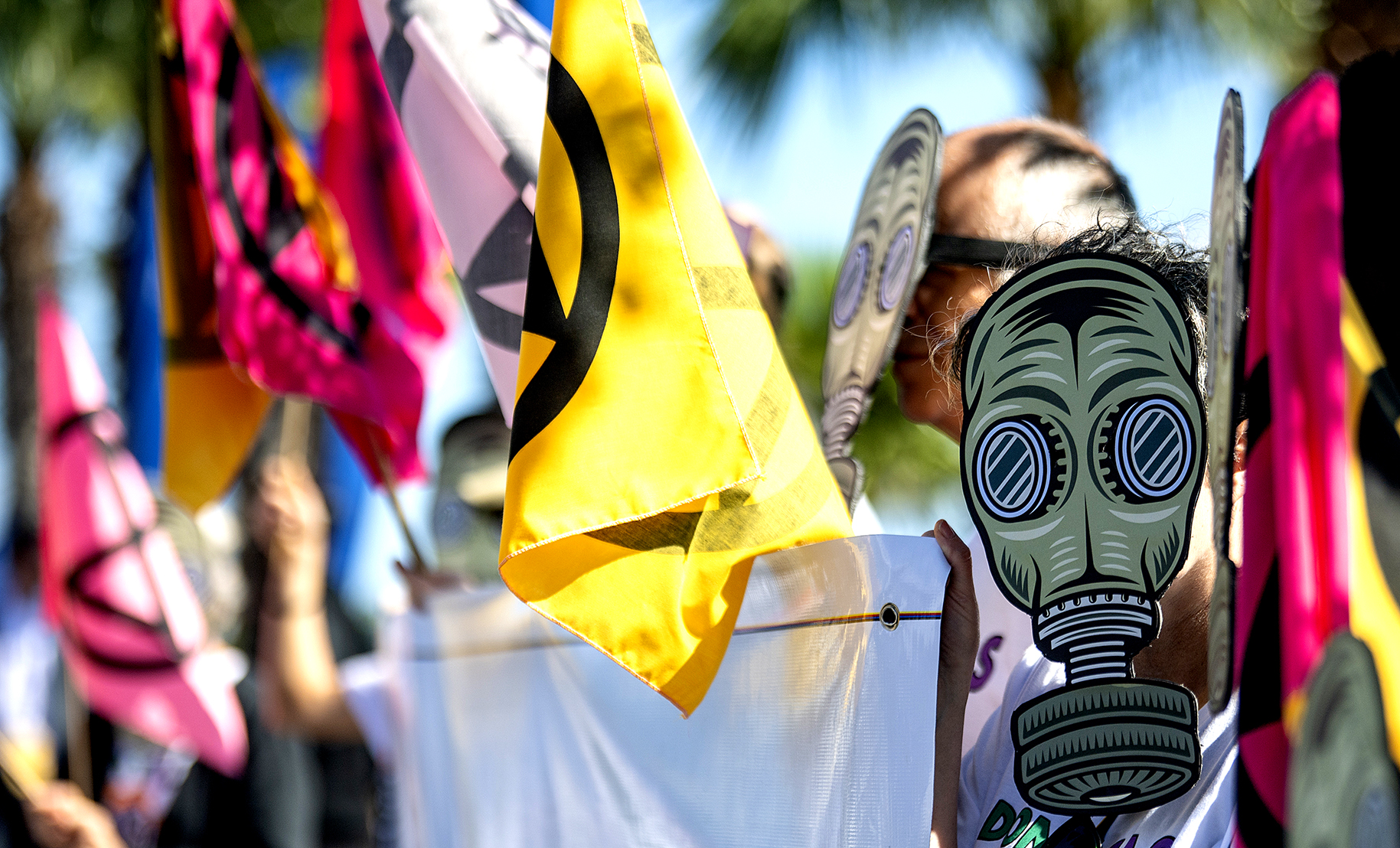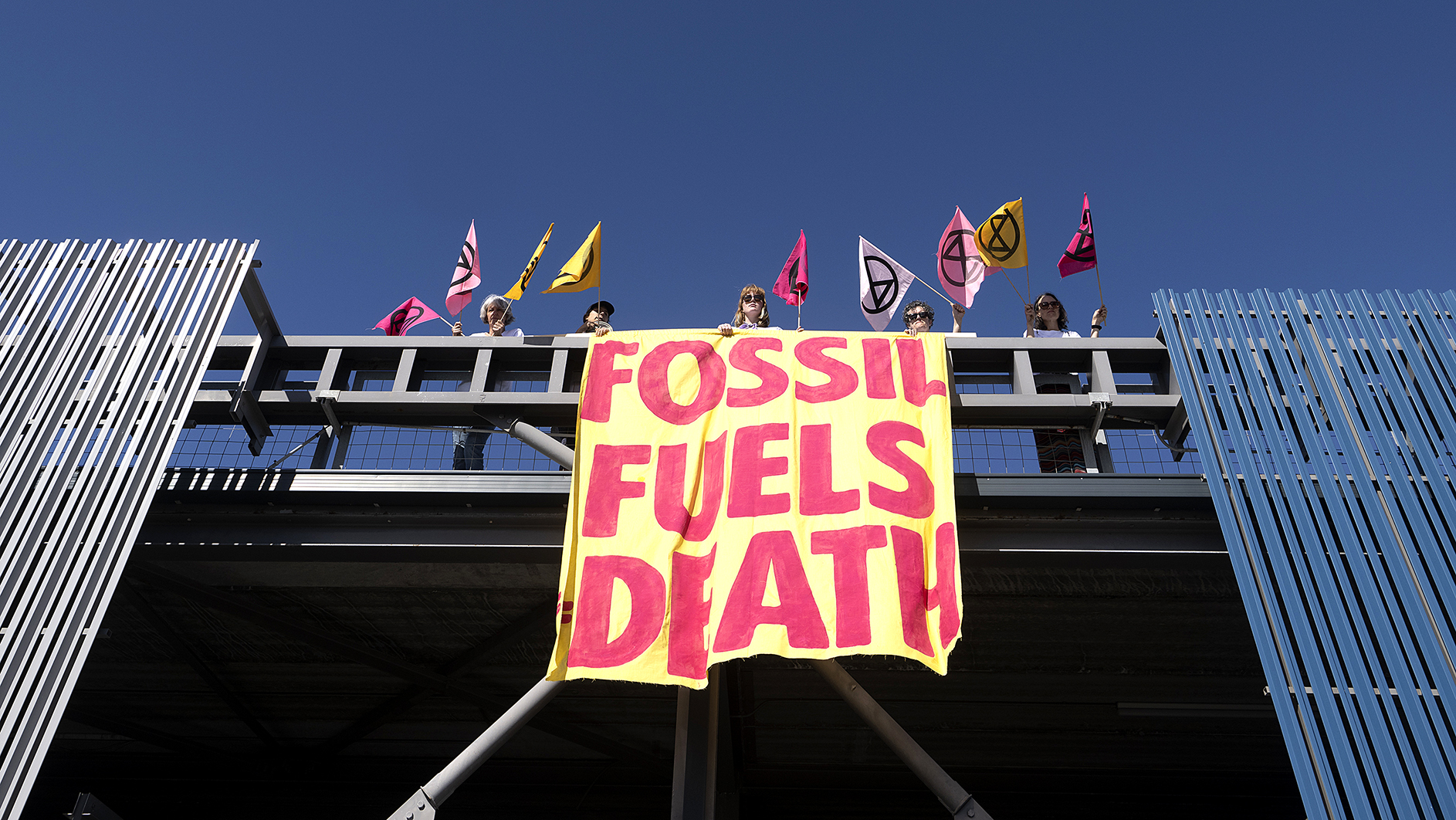AFCON SPORTSWASHING
Ambitious campaign rises to kick TotalEnergies out as a sponsor of Africa Cup of Nations

‘While we love football, we hate pollution — and even more than that, we’re concerned that companies like TotalEnergies are infiltrating our beautiful game with their greenwashing sponsorship,’ says an African network fighting against ‘sportswashing’.
Just before the Africa Cup of Nations (Afcon) kicks off in Côte d’Ivoire, Ivory Coast on 13 January — where over 600 million Africans and 150 nations worldwide are expected to tune in — an African-wide campaign was launched on social media challenging the tournament’s main sponsor, TotalEnergies.
Dear @TotalEnergies
We won’t fall for your sportswashing tactics! You’re sponsoring AFCON to hide your destructive ways in Africa! You’re polluting our continent, making us sick, displacing our people and destroying our environment! @CAF_Online #KickTotalOutOfAFCON #AFCON2024 pic.twitter.com/kRs1498F0Q— #KickTotalOutOfAFCON (@Polluters_Out) January 11, 2024
“Football captures the heartbeat of Africa — the most widely loved, watched, and played sport which unites the continent,” said Magamba Network, the conveners of the campaign.
“But while we love football, we hate pollution! And even more than that, we’re concerned that companies like Total Energies are infiltrating our beautiful game with their greenwashing sponsorship.”
The #KickTotalOutofAFCON campaign is challenging the French oil giant’s sponsorship of Afcon, demanding they stop any planned and new fossil fuel projects, seriously invest in renewables and begin a just and equitable transition for staff and communities involved in existing projects.
The campaign is also demanding that the Confederation of African Football (CAF) — the organisers of this event — end all sponsorship deals with TotalEnergies immediately.

Mamosweu Tsoabi from Sebokeng at the Extinction Rebellion protest outside the Standard Bank Head Office, Rosebank, 22 April, 2022 (Photo: Julia Evans)
The campaign — convened by Zimbabwe-based media organisation, Magamba Network, with an East Africa content hub run by Buni Media and West Africa work covered by hip-hop news platform Journal Rappé — is accusing the multinational oil company of “sportswashing” in an attempt to distract from its negative footprint on the continent.
TotalEnergies SA said they had no comment.
The Kick Polluters Out Network comprises rappers, cartoonists, content creators, satirists, climate justice activists and citizen journalists from around Africa, with the aim of, “fighting against ‘sportswashing’ and greenwashing by big polluters”.
Foul Play Uncovered: Fossil fuel giants enjoy playing sponsorship games with our favourite sports while Africa bears the environmental penalty.
It’s time to #KickPollutersOut of the beautiful game.Cartoon by @iGaddo#KickPollutersout pic.twitter.com/QyXjdPE2ah
— The XYZ Show (@xyzshow) December 18, 2023
Keyti, a prominent Senegalese rapper, c0-founded Journal Rappé with fellow prominent Senegalese rapper Xuman, which is a news programme that uses rap music to communicate local political and social issues (like climate change) to young Senegalese people.
“Since we’ve started working on this campaign, there are lots of things we’ve realised about the use of fossil fuels — how they are destroying our continent and how young Africans need to be more aware of the consequences it’s having on our lives,” said Keyti.
“Our motto is to empower young people through information… because the truth is, young Africans are the ones at this point, who can really change the dynamic in our country.”
WE CAN’T BREATHE!
WE CAN’T BREATHE!
WE CAN’T BREATHE!Africa is being choked to death by Big Oil polluters like @TotalEnergies who continue to invest in Fossil Fuels!#KickTotalOutOfAFCON#KickPollutersOut
(Visuals by Journal Rappe) pic.twitter.com/Tz2GVpeAF8— #KickTotalOutOfAFCON (@Polluters_Out) January 9, 2024
Samm Farai Monro, co-founder of the Magamba Network, said that despite Africa being disproportionately affected by the climate crisis, there are companies like TotalEnergies developing new oil and gas exploration across the continent, despite scientists saying that we can’t have any more new drilling of fossil fuels, because we’ve exhausted our carbon budget.
TotalEnergies is developing more oil and gas resources in Africa than any other company, and they are the biggest shareholders (62%) of one the largest fossil fuel projects underway globally — the East African Oil Pipeline (Eacop) project, which will span 1,443km across eastern Africa, transporting crude oil from Uganda to Tanzania.
Investors of this project have received much backlash and Total has been received criticism, that despite ‘net zero’ claims the oil giant has invested $3.5 – 5-billion in the project, which is estimated to emit 379 million tonnes of carbon dioxide equivalent (MtCO2) throughout its 25 year lifetime, most of which would be from downstream emissions, according to a study by the Climate Accountability Institute.
In July 2023, Human Rights Watch released a report that estimated that the development will ultimately displace over 100,000 people — while Total has set aside $45-million for compensation (a mere 1% of total cost of construction), many have not been compensated and it’s already caused food insecurity and children to leave school.
Another example is northern Mozambique where Total’s $20-billion natural gas project has exacerbated the conflict in the region, with locals claiming that the majority of jobs created in the region have gone to internationals or economically advanced Mozambicans.
This campaign is in partnership with Greenpeace Africa — who also criticised Total’s sponsorship of the Rugby World Cup last year.
Daily Maverick previously reported that despite efforts to become more sustainable, Greenpeace International criticised the 2023 Rugby World Cup for having oil giants TotalEnergy as their sponsor, sharing a video of oil filling up the Stade de France to illustrate how the fossil fuel industry produces a stadium full of oil every three hours and 37 minutes.
Read more in Daily Maverick: World Rugby scores points in move towards sustainability, despite controversial World Cup sponsor
Greenpeace Africa said that TotalEnergies’ ongoing drilling and exploration is a contradiction of the recent COP28 resolution that mandated a global shift away from fossil fuels.
“Africa’s rich natural heritage and the well-being of its people should not be compromised for short-term profits,” said Thandile Chinyavanhu, Greenpeace Africa’s Oil and Gas Campaigner.

Members of the environmental activist group, Extinction Rebellion protest in Granger Bay next to the V&A Waterfront on 20 October, 2022 in Cape Town, South Africa. The group protested the exploitation and consumption of oil and gas resources in Africa. (Photo: Gallo Images / Die Burger /Jaco Marais)
Does climate activism belong in sport?
It might not seem like it, but sports organisations have a responsibility to take part in the fight against climate change.
Daily Maverick previously reported on the symbiotic relationship between the climate crisis and sports, where Dr Pedro Monteiro, chief oceanographer at the Council for Scientific and Industrial Research (CSIR), acknowledged that “the rise in the incidence, magnitude and persistence of extreme events (heat, water cycle, storms) as a result of the continued greenhouse gas emissions will increasingly constrain our social choices, including sports”.
Read more in Daily Maverick: Climate change shifting the goalposts for global sport
“This is likely also to be felt in the planning of large sports events such as world cups and Olympic Games that require long lead times and conditions that accommodate large numbers of people comfortably,” said Monteiro.
Stewart Maginnis, the International Union for the Conservation of Nature (IUCN) deputy director-general has said, “Anyone who has taken a run in a forest or sailed on a lake knows how closely sports are connected to nature”. He added, “At the same time, sports also impact nature in various ways.”
But it is sports tournament reach and viewers that are possibly more important when it comes to funding and influence.

Members of the environmental activist group, Extinction Rebellion. (Photo: Gallo Images / Die Burger / Jaco Marais)
Monro said they are going after Total because they are “a big climate criminal”, the company with the most new oil and gas explorations across the African continent, and they’re going after them at this tournament “because Afcon presents a time when Total is wielding a huge amount of cultural, political and social influence.”
When asked what the Confederation of African Football’s (CAF) response to the campaign is, Luxolo September, spokesperson for the CAF told Daily Maverick, “In the next few hours, we will watch the kick-off of the biggest event on African soil. Please give us space to do this and we can and we will give your questions the attention thereafter.
“The Afcon is watched by over 600 million Africans and the rest of the world. We ask African media to assist us in building this — something that belongs to us, Africans.” DM

















 Become an Insider
Become an Insider
There is no doubt that the world needs to move to cleaner energy and the conservation of the planet. Attracting sponsors to sport is an already mammoth task and there are very few. I get that one could argue those that can afford it can afford it based on exploitation but I have sympathy for the organizers. Perhaps the balance is understanding what TotalEnergies is putting back into the game on the continent.
No mention in this article about the role of African government. They are the ones who give out drilling concessions. It is easy to take on the sponsor. Yes they profit, but they also do the work. What about taking on the real beneficiaries. No drilling can happen without concessions and the financial benefits (passive income for govenments, and probably individuals) coming with that.